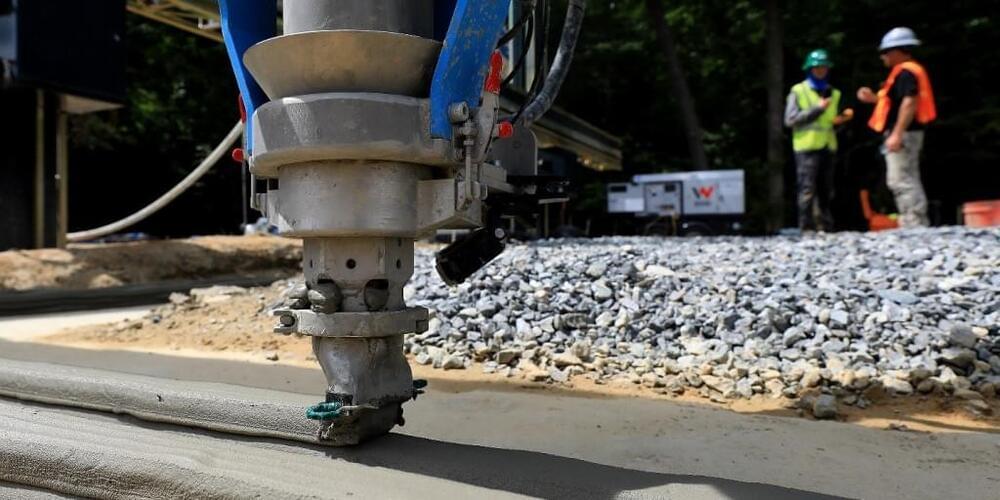Where is AI Going Over the Next Two Decades? The Sci-Fi Story that AI Will Destroy All the Jobs Will Slowly Fade as AI Becomes More Deeply Collaborative and Co-Creative.
Category: employment – Page 42
Robots will create more jobs than they displace: Report
Computer, car etc also created lots of new jobs.
A new report from the World Economic Forum projects that machines will handle half of the workplace tasks by 2025.


World’s Most Amazing Materials That Will Blow Your Mind
For any issue please contact us at 👇🏻
[email protected] : https://www.facebook.com/ttienglish007
Instagram : https://www.instagram.com/top_10_information/
Twitter : https://twitter.com/tti_english.
# Ultra Hydrobhobic Material (Gentoo)
Gentoo is the next generation of corrosion-resistant and easy-cleaning coatings. With its combination of high performing abrasion resistance and very low sliding angle, Gentoo excels where other coatings have fallen short https://goo.gl/LgBgXL
https://goo.gl/vcfXEd.
https://goo.gl/n8yzDV
https://goo.gl/rGUikJ# Triiodide.
n chemistry, triiodide is usually referred to the triiodide ion, I−
3. This anion, one of the polyhalogen ions, is composed of three iodine atoms. It is formed by combining aqueous solutions of iodide salts and iodine.
https://en.wikipedia.org/wiki/Triiodide.
https://goo.gl/AVfLSk.
https://goo.gl/dFnZSu.
https://goo.gl/X7fgnL
https://goo.gl/t3nYZd.
https://goo.gl/xEJXeb# Hydrogel.
Hydrogel products constitute a group of polymeric materials, the hydrophilic structure of which renders them capable of holding large amounts of water in their three-dimensional networks. Extensive employment of these products in a number of industrial and environmental areas of application is considered to be of prime importance.
https://goo.gl/T85Nkj.
https://en.wikipedia.org/wiki/Gel.
https://goo.gl/SQj5zg.
https://goo.gl/gTmWe3
https://goo.gl/i99LTk.
https://goo.gl/BfVgKN# Nitinol.
Nitinol alloys exhibit two closely related and unique properties: shape memory effect (SME) and superelasticity (SE; also called pseudoelasticity, PE). Shape memory is the ability of nitinol to undergo deformation at one temperature, then recover its original, undeformed shape upon heating above its “transformation temperature”.
https://en.wikipedia.org/wiki/Nickel_titanium.
https://goo.gl/mtFu8S
https://goo.gl/kdUshM
https://goo.gl/ncXF3X
https://goo.gl/sbnvtY
https://goo.gl/Uc3pdX
https://goo.gl/V3DWEx# Gallium metal.
https://goo.gl/2jv7P1
https://goo.gl/B8KMqf.
https://goo.gl/1Lsk9n.
https://goo.gl/YPfRzH
https://goo.gl/6Td8Q4
https://goo.gl/va94iV# Aerogel.
https://goo.gl/Wq69zr.
https://goo.gl/6ag7zV
https://goo.gl/2LAJSy.
https://goo.gl/Z5BV5g.
https://goo.gl/hw8m81
https://goo.gl/hVqBz1# Magnetic Thinking Putty!
https://goo.gl/Pvos7a.
https://goo.gl/1Tg8Cg.
https://goo.gl/zTHbwJ
https://goo.gl/TSrQSN
https://goo.gl/W37Wyh.
https://goo.gl/4C1avx.
special Credits:
CrazyRussianHacker.
https://www.youtube.com/user/CrazyRussianHackerGrant
Thompson — “The King of Random“
https://www.youtube.com/user/010320108141-FerroFluid.
https://goo.gl/TpSZLc.
https://goo.gl/SF7qh9
https://goo.gl/65uTND
https://goo.gl/ze9GR4
https://goo.gl/Fe2Wdy.
https://goo.gl/pXQkd42-Liquid Nitrogen.
https://goo.gl/Xj4sEM
https://goo.gl/d5Go3j.
https://goo.gl/fBtdHC
https://goo.gl/xnuFNR
https://goo.gl/jmYgrj.
https://goo.gl/tQZZ4C
https://goo.gl/vHwdPE
3-Dry Ice.
https://goo.gl/7W3Cjh.
https://goo.gl/7QF8kB
https://goo.gl/uX8KdL
https://goo.gl/rmTpXs.
https://goo.gl/nvoXgf.
https://goo.gl/Mz2EBH
https://goo.gl/ndB7Rn.
https://goo.gl/ZCBxmE
https://goo.gl/4GnrsM
https://goo.gl/VQjNCX
https://goo.gl/LJXgoR
https://goo.gl/CyHL5E
https://goo.gl/reB3cN4-Black Fire Snake.
https://goo.gl/xNUJgz.
https://goo.gl/zSAjY2
https://goo.gl/eWCFp7
https://goo.gl/w7mafY
https://goo.gl/jYGWZT
https://goo.gl/LgUgqD
https://goo.gl/N24pV3
https://goo.gl/zeQaRn.
https://goo.gl/g3wpTX5-Magical Fire.
https://goo.gl/hdyMVL
https://goo.gl/mh1FUK
https://goo.gl/vJ9N8A
https://goo.gl/C1Emto.
https://goo.gl/pZvwvL6-Sodium Metal.
https://goo.gl/LLmqfe.
https://goo.gl/nQG2Vv.
https://goo.gl/K3KfGC
https://goo.gl/ooLwyP
https://goo.gl/Asxu3t.
https://goo.gl/G8cu2g.
https://goo.gl/CGBemZ
https://goo.gl/pgUi2Y7-Burning calories (Sugar)
https://goo.gl/ch9ihk.
https://goo.gl/MNRTnC
https://goo.gl/qeRQcW
https://goo.gl/fCaLZm.
https://goo.gl/tV7Xie.
https://goo.gl/2e3kjF
https://goo.gl/7WLYte.
https://goo.gl/Q4uirf.
8-Elephant Toothpaste.
https://goo.gl/zHTN2i.
https://goo.gl/GJm168
https://goo.gl/Tm71ej.
https://goo.gl/Hv6Ng3
https://goo.gl/vdbKbU
https://goo.gl/wB6P5Y
https://goo.gl/Ez4Gyg.
https://goo.gl/xkwyJL9-The Litracon.
https://goo.gl/gjR8oj.
https://goo.gl/8tn2vd.
https://goo.gl/viBNP2
https://goo.gl/wqxZMY
https://goo.gl/a3f9PD
https://goo.gl/yQvW4S10-The Neodymium.
https://goo.gl/D9RPnq.
https://goo.gl/3Vccem.
https://goo.gl/dvWgHk.
https://goo.gl/8yvA4d.
https://goo.gl/6HKRPj.
https://goo.gl/HsqgS4
https://goo.gl/s3NjZL
https://goo.gl/Jia5hs.
https://goo.gl/ALVFzB
https://goo.gl/kzjVCg.
https://goo.gl/3LHzd5
https://goo.gl/KnrTg3
https://goo.gl/uQWwg8
#experiment #material #science
Is it ethical to use AI art? Some thought on this topic
2022 the Colorado State Fair’s annual art competition gave out prizes in all the usual art categories.
“Thé tre D’opéra Spatial,” took home the blue ribbon in the fair’s contest for emerging digital artists — making it one of the first A.I.-generated pieces to win such a prize.
#booktube #authortube #writingtube #aiart #midjourney.
What companies are active in this field?
Is it ethic or legal to create, use and sell AI art?
Will AI mark the end of jobs?
Prepare for the age of deep fake.
Here are some thoughts on this topic. I don’t have a definite answer to all these question, but one thing is for certain: AI is here to stay.
Link to Raoul Pal & E. Mostaque: A Complete SHIFT in Society!
AI Art companies:
AI, Robots & the Future
Robots and AI are already real products and services. But will they take our jobs? Or even take over? In this video I discuss these questions in a pragmatic fashion, as well as how we may usefully define “artificial intelligence”. Also covered are cloud AI services, and the role AI in digital transformation.
REFERENCES & OTHER LINKS:
Alan Turing’s 1950 paper in “Mind” on ‘Computing Machinery and Intelligence’:
https://www.csee.umbc.edu/courses/471/papers/turing.pdf.
IBM Watson (cloud AI):
https://www.ibm.com/watson.
Google AI & Machine Learning Products:
https://cloud.google.com/products/ai.
Microsoft Azure Cognitive Services: https://azure.microsoft.com/en-gb/services/cognitive-services/
ChatGPT Writes Code 🔥 End Of All Programming Jobs? Your Mind Will Blow After Seeing This!
OpenAI released a new chatbot called ChatGPT which is insanely good in human conversation. It also writes code with very high accuracy. What is going to happen to all programming jobs and data scientist jobs now? Let’s see a demo of ChatGPT and discuss a few important concerns associated with this. Towards the end of the video, I will ask a question that will do a rest test on ChatGPT’s ability to replace programmer job, you will be amazing to see how ChatGPT responds to that specific query 😊
Do you want to learn technology from me? Check https://codebasics.io/?utm_source=description&utm_medium=yt&…escription for my affordable video courses.
Need help building software or data analytics/AI solutions? My company https://www.atliq.com/ can help. Click on the Contact button on that website.
🎥 Codebasics Hindi channel: https://www.youtube.com/channel/UCTmFBhuhMibVoSfYom1uXEg.
#️⃣ Social Media #️⃣
🔗 Discord: https://discord.gg/r42Kbuk.
📸 Dhaval’s Personal Instagram: https://www.instagram.com/dhavalsays/
📸 Codebasics Instagram: https://www.instagram.com/codebasicshub/
🔊 Facebook: https://www.facebook.com/codebasicshub.
📱 Twitter: https://twitter.com/codebasicshub.
📝 Linkedin (Personal): https://www.linkedin.com/in/dhavalsays/
📝 Linkedin (Codebasics): https://www.linkedin.com/company/codebasics/
🔗 Patreon: https://www.patreon.com/codebasics?fan_landing=true

Robots Will Replace These Workers By 2025
This post is also available in:  עברית (Hebrew)
עברית (Hebrew)
How soon will we be seeing robots walking about the street? How soon will robots join medical staff in hospitals and aid real people in life or death situations? How soon will robots replace health staff? The World Health Organization (WHO) estimates that we will see a global shortfall of 12 million health workers by 2025.
From lifting patients and delivering lab samples, to cleaning and providing companionship, care robots can help with a range of tasks across a hospital or care setting. With nurses spending up to a third of their shift on menial tasks such as collecting equipment, the expectation is that care robots will be able to take ownership of these more mundane jobs, letting health staff focus on more important tasks.
Amazon debuts a fully autonomous warehouse robot
You can’t discuss fulfillment robots without mentioning Amazon. Over the past decade, the retail juggernaut has become the 800-pound gorilla in the category, courtesy of several key acquisitions and seemingly endless resources. And while warehouse robotics and automation have been accelerated amid the pandemic and resulting employment crunch, Amazon Robotics has been driving these categories for years now.
This week at its annual Re: Mars conference in Las Vegas, the company celebrated a decade of its robotics division, which was effectively born with its acquisition of Kiva Systems. Over the course of its life, Amazon Robotics has deployed more than 520,000 robotic drive units, across its fulfillment and sort centers. From the outside, it’s been a tremendous success in the company’s push toward same-and next-day package delivery, and its driven the competition to look for their own third-party robotics solutions, bolstering startups like Locus, Fetch and Berkshire Grey.